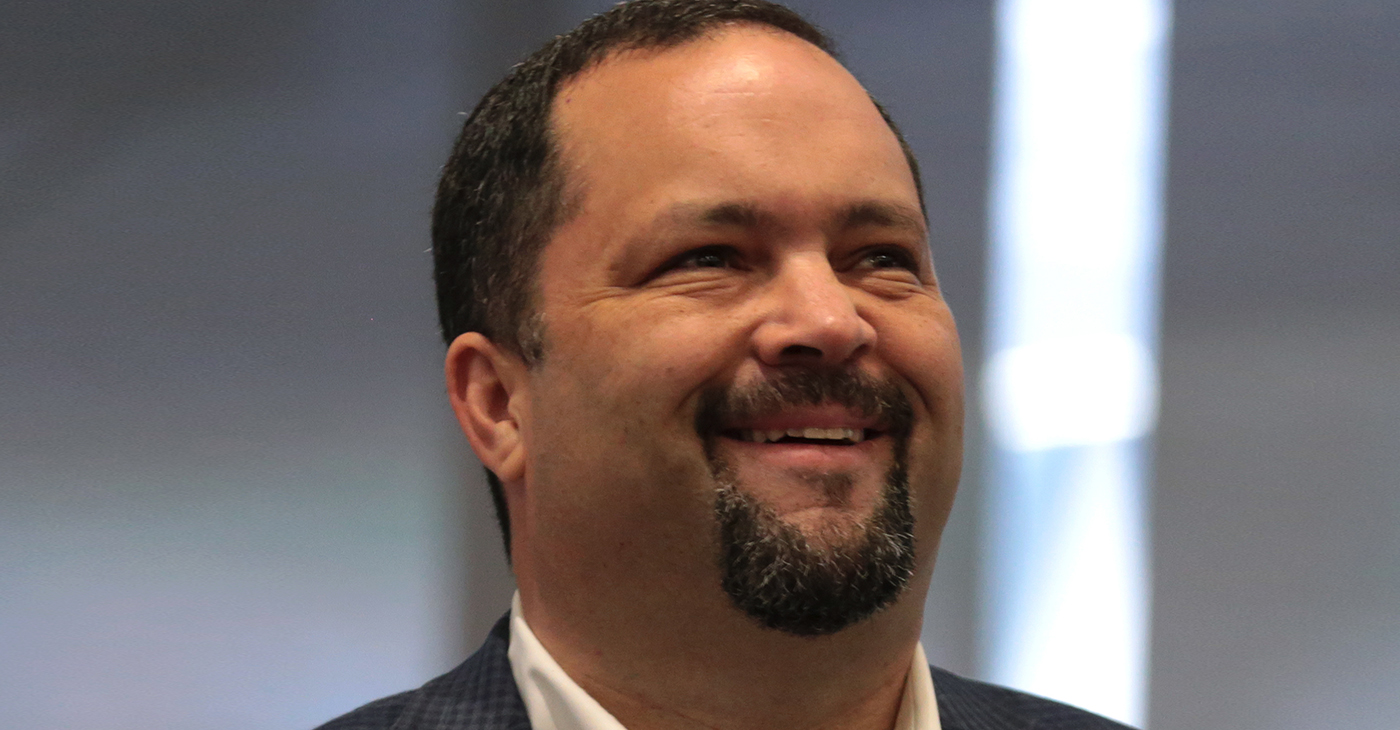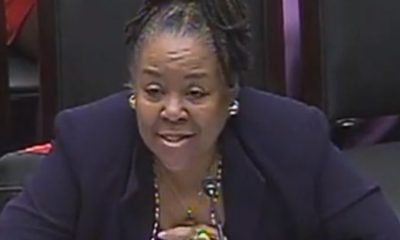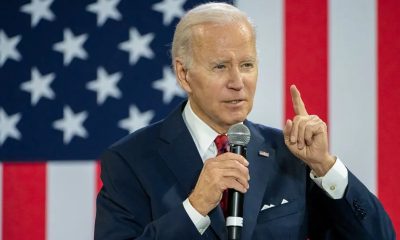Activism
COMMENTARY: Redistricting is Voter Suppression Too
We’ve all heard about the restrictive voter suppression laws that far-right state legislatures are passing. We’ve heard about the crackdowns on voting hours and mail-in voting, and even on giving food and water to voters in long lines. But we don’t hear enough about redistricting as another weapon being used to intimidate voters and keep us from exercising our constitutional rights. It is erasing us from Congress and state legislatures. We need to call it out and challenge it where we see it.

By Ben Jealous
When Charles Diggs, Jr. won election to Congress in Michigan’s 13th District in 1954, he launched nearly seven decades in which the city of Detroit had at least one Black member of Congress. That’s likely to change this year. Because of redistricting, Detroit no longer has majority-Black congressional districts. And in the first primary election with newly drawn district lines, a Black candidate did not win the Democratic contest in the heavily Democratic 13th. That means the city is likely to lack Black representation in Congress for the first time in decades.
Redistricting is robbing Black candidates and voters of years of hard fought for opportunities. In Detroit, new districts merged Black areas of the city with white neighborhoods across 8 Mile Road. The city stands to lose Black representation in Congress and have less representation in the state legislature. Knowing what the impact could be, voters have spoken out forcefully against the new redistricting maps from pulpits to street corners to the state capitol and even before the state courts.
Sadly, Michigan is not alone. The New York Times reported in August that this year, “judges in Alabama, Georgia, Louisiana and Ohio have found that Republican legislators illegally drew those states’ congressional maps along racial or partisan lines, or that a trial very likely would conclude that they did.” But elections are moving forward anyway.
We’ve all heard about the restrictive voter suppression laws that far-right state legislatures are passing. We’ve heard about the crackdowns on voting hours and mail-in voting, and even on giving food and water to voters in long lines. But we don’t hear enough about redistricting as another weapon being used to intimidate voters and keep us from exercising our constitutional rights. It is erasing us from Congress and state legislatures. We need to call it out and challenge it where we see it.
Calling out and challenging means organizing, litigating, and legislating. It means supporting national and local organizations that unite communities against racist gerrymandering and seek justice in the courts. They might not win every case, but advocacy and activism are essential to righting this wrong.
We must also keep voting, running for office, and educating. My organization, People For the American Way, houses an African American Religious Affairs network that has reaffirmed for more than a decade that “every election matters and every vote counts” — and that includes primaries. For Black ministers in our network, voting and civic participation are acts of faith and so much more. As Reverend Dr. Steve Bland, Jr., pastor of Liberty Temple Baptist Church in Detroit said, “It’s not about left or right. Splitting Detroit into two districts was an insult. But we have faith and must “deal with our self-interest by voting in every election!”
I know that a lot of media coverage of this summer’s primaries has focused on one big question: will Trump-style, MAGA candidates win or lose? But there’s another question that needs to be asked: how harmful are the impacts of redistricting on our communities in this year’s elections and those to come? The current reality dictates that we do not sit out any election. We need to resolutely register, educate, motivate and turn out voters. In every election. Every time.
Ben Jealous serves as president of People for the American Way and Professor of Practice in the Africana Studies Department at the University of Pennsylvania where he teaches leadership.
Activism
Oakland Post: Week of April 24 – 30, 2024
The printed Weekly Edition of the Oakland Post: Week of April 24 – 30, 2024

To enlarge your view of this issue, use the slider, magnifying glass icon or full page icon in the lower right corner of the browser window. ![]()
Activism
Oakland Post: Week of April 17 – 23, 2024
The printed Weekly Edition of the Oakland Post: Week of April 17 – 23, 2024

To enlarge your view of this issue, use the slider, magnifying glass icon or full page icon in the lower right corner of the browser window. ![]()
Activism
Oakland Schools Honor Fred Korematsu Day of Civil Liberties
Every Jan. 30, OUSD commemorates the legacy of Fred Korematsu, an Oakland native, a Castlemont High School graduate, and a national symbol of resistance, resilience, and justice. His defiant stand against racial injustice and his unwavering commitment to civil rights continue to inspire the local community and the nation. Tuesday was “Fred Korematsu Day of Civil Liberties and the Constitution” in the state of California and a growing number of states across the country.

By Post Staff
Every Jan. 30, OUSD commemorates the legacy of Fred Korematsu, an Oakland native, a Castlemont High School graduate, and a national symbol of resistance, resilience, and justice.
His defiant stand against racial injustice and his unwavering commitment to civil rights continue to inspire the local community and the nation. Tuesday was “Fred Korematsu Day of Civil Liberties and the Constitution” in the state of California and a growing number of states across the country.
One OUSD school is named in his honor: Fred T. Korematsu Discovery Academy (KDA) elementary in East Oakland.
Several years ago, founding KDA Principal Charles Wilson, in a video interview with anti-hate organization “Not In Our Town,” said, “We chose the name Fred Korematsu because we really felt like the attributes that he showed in his work are things that the children need to learn … that common people can stand up and make differences in a large number of people’s lives.”
Fred Korematsu was born in Oakland on Jan. 30, 1919. His parents ran a floral nursery business, and his upbringing in Oakland shaped his worldview. His belief in the importance of standing up for your rights and the rights of others, regardless of race or background, was the foundation for his activism against racial prejudice and for the rights of Japanese Americans during World War II.
At the start of the war, Korematsu was turned away from enlisting in the National Guard and the Coast Guard because of his race. He trained as a welder, working at the docks in Oakland, but was fired after the bombing of Pearl Harbor in 1941. Fear and prejudice led to federal Executive Order 9066, which forced more than 120,000 Japanese Americans out of their homes and neighborhoods and into remote internment camps.
The 23-year-old Korematsu resisted the order. He underwent cosmetic surgery and assumed a false identity, choosing freedom over unjust imprisonment. His later arrest and conviction sparked a legal battle that would challenge the foundation of civil liberties in America.
Korematsu’s fight culminated in the Supreme Court’s initial ruling against him in 1944. He spent years in a Utah internment camp with his family, followed by time living in Salt Lake City where he was dogged by racism.
In 1976, President Gerald Ford overturned Executive Order 9066. Seven years later, the 9th Circuit Court of Appeals in San Francisco vacated Korematsu’s conviction. He said in court, “I would like to see the government admit that they were wrong and do something about it so this will never happen again to any American citizen of any race, creed, or color.”
Korematsu’s dedication and determination established him as a national icon of civil rights and social justice. He advocated for justice with Rosa Parks. In 1998, President Bill Clinton gave him the Presidential Medal of Freedom saying, “In the long history of our country’s constant search for justice, some names of ordinary citizens stand for millions of souls … To that distinguished list, today we add the name of Fred Korematsu.”
After Sept. 11, 2001, Korematsu spoke out against hatred and discrimination, saying what happened to Japanese Americans should not happen to people of Middle Eastern descent.
Korematsu’s roots in Oakland and his education in OUSD are a source of great pride for the city, according to the school district. His most famous quote, which is on the Korematsu elementary school mural, is as relevant now as ever, “If you have the feeling that something is wrong, don’t be afraid to speak up.”
-

 Activism4 weeks ago
Activism4 weeks agoOakland Post: Week of March 27 – April 2, 2024
-

 #NNPA BlackPress4 weeks ago
#NNPA BlackPress4 weeks agoCOMMENTARY: D.C. Crime Bill Fails to Address Root Causes of Violence and Incarceration
-

 #NNPA BlackPress4 weeks ago
#NNPA BlackPress4 weeks agoMayor, City Council President React to May 31 Closing of Birmingham-Southern College
-

 #NNPA BlackPress4 weeks ago
#NNPA BlackPress4 weeks agoBeloved Actor and Activist Louis Cameron Gossett Jr. Dies at 87
-

 Community1 week ago
Community1 week agoFinancial Assistance Bill for Descendants of Enslaved Persons to Help Them Purchase, Own, or Maintain a Home
-

 Activism3 weeks ago
Activism3 weeks agoOakland Post: Week of April 3 – 6, 2024
-

 Business1 week ago
Business1 week agoV.P. Kamala Harris: Americans With Criminal Records Will Soon Be Eligible for SBA Loans
-

 Activism2 weeks ago
Activism2 weeks agoOakland Post: Week of April 10 – 16, 2024


















































